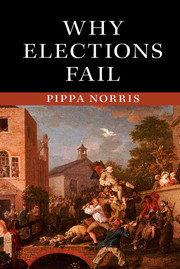2 - Evidence
from PART I - INTRODUCTION
Published online by Cambridge University Press: 05 August 2015
Summary
Systematic and reliable evidence about the quality of elections is essential for scholars and practitioners. Within comparative politics, accurate data provide more precise regime classifications that can distinguish autocracies (with manipulated elections and façade competition) from democratic states (with contests characterized by regular alternation between governing and opposition parties and inclusive electoral procedures). Classification and measurement are also critical for a comprehensive understanding of political attitudes and voting behavior, for institutional studies analyzing the effects of electoral systems and processes, and for research focused on the triggers of electoral violence. Accurate indicators are also equally valuable for aid agencies and electoral officials, especially for evidence-based evaluations seeking to determine what particular types of policy interventions are most effective to strengthen integrity in any society, such as programs designed to reduce vote corruption in Afghanistan, to restore trust in elections in Thailand, or to improve security in Nigerian contests.
Yet attempts at precise measurement are immediately confronted by the fact that the concept of electoral integrity is relatively abstract and multidimensional. In practice, evaluations of the actual quality of elections often prove highly contentious where contests end in a flurry of challenges concerning the legitimacy of the electoral authorities, the underlying procedural rules of the game, and the outcome. News headlines amplify opposition cries of fraud and stolen elections. Sore losers have a natural incentive to contend that an election was rigged or stolen, both to excuse a poor performance (and thus deter leadership rivals) and to undermine the authority of the winners. Election disputes are fairly common; for example, one study suggests that during the last decade around 12 percent of elections worldwide saw opposition boycotts, 17 percent experienced post-election riots or protests, and 18 percent had electoral violence involving at least one civilian fatality. These problems are particularly evident in hybrid states; for example, polling day ended with street protests about alleged ballot box fraud, corruption, and flawed voter registers in recent contests in Cambodia, Thailand, and Bangladesh. The most problematic cases, such as Kenya in 2007, generate bloodshed and growing instability in fragile states. Disputes are also becoming increasingly common in long-established democracies; since the 2000 US presidential elections, for example, rival charges of voter fraud (by Republicans) and voter suppression (by Democrats) have become increasingly polarized in America.
- Type
- Chapter
- Information
- Why Elections Fail , pp. 26 - 60Publisher: Cambridge University PressPrint publication year: 2015



